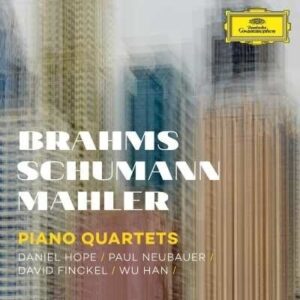Recorded live at The Chamber Music Society of Lincoln Center at two concerts in March, 2015, this CD caught my eye with the promise of a glimpse of Mahler–albeit a 16-year-old Mahler–in his formative years. And indeed the 12-minute fragment is interesting, if for no reason other than how un-Mahlerian it sounds. Only re-discovered in the 1960s by Alma Mahler, it is distinctively late-Romantic and it would be close to impossible to name the composer if he or she didn’t know. The guesses likely would be Mendelssohn or Brahms, but knowing the truth you hear a particular brand of edgy sadness and yearning–and a pair of pianissimo pizzicato plucks to end the work–that might be heard as Mahlerian. At any rate, it’s quite beautiful and the playing is exceptionally sympathetic, with Wu Han’s piano seeming to hold it together and Daniel Hope’s violin cadenza a brief, showy moment.
But Mahler clearly needed more than four instruments. More than once in his symphonies Mahler interrupts the musical proceedings with either a march or a call to barracks; the third movement of the Brahms quartet features just such a moment, although it lacks the wit and irony with which Mahler tended to suffuse such episodes. Nonetheless, it’s a lovely piece, beautifully played with its vaguely “I have the vapors” feeling interrupted by the band that intrudes and then leaves. All ears are on the finale, marked “Rondo alla zingarese; Presto”, and called the “Gypsy Rondo” by its friends. Jumpy and in duple time except for some heavy schmaltz in the middle, it is rhythmically maddening and fascinating, and very difficult to play, not to mention bizarrely halted twice near the close with piano cadenzas.
Perhaps the epitome of the echt-Romantic quartet is the Schumann E-flat major. Even the scherzo, with Queen Mab pizzicatos to start, turns into a lovely song, and the gorgeous third movement, with its melodic reliance on the cello’s dark hue and the toodlings of the violin quietly above it and the piano around it, feels like an evening in front of the fire. The finale, lively and filled with counterpoint, still keeps it delicacy.
Daniel Hope’s violin can turn sharp-edged at the top of its range at forte, but it adds excitement; Wu Han, despite her impeccable manners, often shines more than the others–the writing is such. Violist Paul Neubauer is hardly overlooked; although he rarely gets the tune, he’s always in the picture, and David Finckel’s cello playing has great warmth. The sound is ideally balanced. Applause interrupts only at the end. If this heavily-scented chamber music is your cup of tea, you will be very pleased.
































